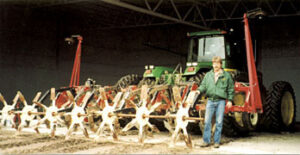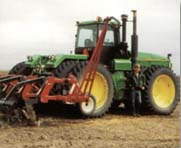 South-eastern Alberta’s vast tracts of sun-drenched land are a far cry from the tidy fields of north-east Holland, but Koert Sikkens has proved that a good farmer can be successful, no matter what the setting. “My father and I used to operate a dairy/grain/potato farm near the German border,” says Koert. “In 1988, though, we decided to emigrate to Canada.” Koert explains that there were many factors influencing their decision. “A lot of farmers are leaving the land every year in Holland,” says Koert. “The growing population puts a lot of pressure on the supply of land and the government’s strict environmental controls are a real challenge for the average farmer. But perhaps the biggest development in European agriculture has been the opening up of the former Communist bloc countries. It’s pretty hard to compete against them when they have both cheap land and cheap labour.”
South-eastern Alberta’s vast tracts of sun-drenched land are a far cry from the tidy fields of north-east Holland, but Koert Sikkens has proved that a good farmer can be successful, no matter what the setting. “My father and I used to operate a dairy/grain/potato farm near the German border,” says Koert. “In 1988, though, we decided to emigrate to Canada.” Koert explains that there were many factors influencing their decision. “A lot of farmers are leaving the land every year in Holland,” says Koert. “The growing population puts a lot of pressure on the supply of land and the government’s strict environmental controls are a real challenge for the average farmer. But perhaps the biggest development in European agriculture has been the opening up of the former Communist bloc countries. It’s pretty hard to compete against them when they have both cheap land and cheap labour.”
Koert settled in an area between Coaldale and Taber and purchased 80 acres of grassland which his father rents from him. He has very little time to spend working his own land given the success of his custom farming operation CFA – Agrow Services Ltd. “In 1989 I became aware of a situation of a chemical being registered for use but there was a lack of equipment to apply it when the grain was tall. This was a type of work I’d had experience with so I imported some high clearance sprayers from Holland and went into business.”
Koert dedicated the next few years to his custom spraying operation before becoming involved with Ag Engineering and Development Co., a Tri-Cities, WA manufacturer of farm implements. Ag Engineering produce the Dammer Diker (Reg’d.) an implement that is custom-built to meet the farmer’s requirements for potato cultivation, sugar beets, grain, or a variety of other applications. “It’s a series of shanks with wear points that rip the soil,” explains Koert. “Each shank has a hilling wing so that the dirt is pushed together into a hill from each side. Other methods of creating hills, such as sub-soiling, for example, are nowhere near as effective. The sub-soil is really coarse and a lot of the dirt gets dried out so then you have to go in with a disc. The Dammer Diker is used in the fall to create hills but is also effective in the spring in weed control and re-shaping of the hills.”
 Koert was so taken with the advantages of the Dammer Diker that he is now the authorized dealer for the equipment in Alberta, Saskatchewan, and Manitoba. According to Koert, using the Dammer Diker means there are fewer passes to make and there’s an additional advantage in that it stops water run-off before it starts. “The scoops on the Dammer Diker ‘s star wheel create reservoirs for water and fertilizer which are eventually funnelled deep into the ripped soil,” says Koert. “So if the snow melts really fast in the spring, the moisture is retained in the reservoirs instead of collecting in the low spots. One of the big advantages to the farmer is that he can get on his fields earlier in the spring the soil warms up faster and there’s no time lost waiting for the low spots to dry out.”
Koert was so taken with the advantages of the Dammer Diker that he is now the authorized dealer for the equipment in Alberta, Saskatchewan, and Manitoba. According to Koert, using the Dammer Diker means there are fewer passes to make and there’s an additional advantage in that it stops water run-off before it starts. “The scoops on the Dammer Diker ‘s star wheel create reservoirs for water and fertilizer which are eventually funnelled deep into the ripped soil,” says Koert. “So if the snow melts really fast in the spring, the moisture is retained in the reservoirs instead of collecting in the low spots. One of the big advantages to the farmer is that he can get on his fields earlier in the spring the soil warms up faster and there’s no time lost waiting for the low spots to dry out.”
Koert spends much of his time doing custom work with the Dammer Diker for local farmers. “Most of the big farms, those with more than 1,000 acres, buy their own equipment once they see the advantages. But, for the smaller operations, it is more cost-effective for them to hire me to come in and do the work for them. They really like the fact that the Dammer Diker gives each plant equal access to moisture, nutrients, temperature, and air,” say Koert.
Koert Sikkens was first introduced to Power Up products in the fall of ’96. He had purchased a four-wheel drive tractor, a John Deere 8770, but was finding it had insufficient horsepower. “Working with potatoes, you need to be able to operate at a consistent speed of 5 m.p.h. to be able to form proper hills and to be able to break up the soil in the spring. This tractor was always just a little short of the mark. I talked to my local Power Up representative and we decided to run an experiment by trying Power Up products throughout the tractor. I figured I had nothing to lose so why not?”
Koert recalls that his rep. visited him while he was working with the Dammer Diker in a customer’s fields. “He put in NNL 690 and NNL 690G for the John Deere’s engine and gears, Hydramaxx for the hydraulics, and Gen 49D for the diesel fuel. Then he left for town after promising he would check back with me later that afternoon. Well, within an hour, I noticed such an improvement that I began to wonder what the heck was going on! At first, I thought maybe the soil was getting lighter but I knew that couldn’t make such a difference. I was getting a higher r.p.m, reading so I thought maybe I should shift up a gear. The tractor always worked at 1850 r.p.m. before, but with Power Up I gained one gear plus 100 r.p.m. and instead of operating at 4.5 m.p.h., I was able to achieve 5.5 m.p.h. Now, when I operate the tractor at 5 m.p.h., I always feel I have a little bit in reserve which is great.”
With the increase in his tractor’s horsepower, Koert increased the number of acres he can work in a given time frame. “I can cover an extra 2.3 acres per hour which translates into 18.4 additional acres in an 8-hour day, and 27.6 acres in a 12-hour day. Another benefit is that I can go much longer between oil changes – a real bonus for me when I am working 24 hours a day in my busy season.”
Koert is so pleased with the added performance he is getting that he has extended his use of Power Up products to the other equipment that he owns. Apart from his tractors, he uses it in his self-propelled high clearance sprayer, his tandem truck, and his Chevy diesel pick-up truck
